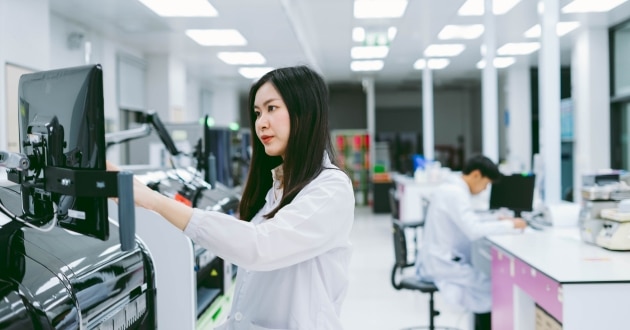In the intricate world of healthcare, many unsung heroes work behind the scenes to ensure accurate diagnoses and effective treatments. Among these professionals, the medical laboratory technologist stands out.
These skilled individuals perform essential laboratory tests that provide crucial information for patient care. This comprehensive guide delves into the role of a medical laboratory technologist, covering the necessary education, skills, and career prospects.
What is a Medical Laboratory Technologist?

A medical laboratory technologist is a healthcare professional who performs complex tests on patient samples, including blood, urine, and tissue. These tests help diagnose diseases, monitor treatments, and conduct research. Technologists use sophisticated equipment and techniques to analyze samples, ensuring accuracy and reliability.
Education and Training Requirements
High School Preparation
Aspiring technologists should focus on science courses such as biology, chemistry, and physics during high school. Excelling in these subjects lays a strong foundation for further education in medical laboratory technology.
Bachelor’s Degree Programs
The next step is obtaining a bachelor’s degree in medical laboratory technology or a related field. These programs typically include coursework in microbiology, hematology, clinical chemistry, and immunology, alongside hands-on laboratory experience.
Certification and Licensing
After earning a degree, graduates must obtain certification from a recognized organization, such as the American Society for Clinical Pathology (ASCP). Certification requires passing an exam that tests knowledge and skills in various areas of laboratory science. Additionally, some states require licensure, which may involve additional exams and continuing education.
Essential Skills for a Medical Laboratory Technologist
Analytical Skills
Technologists must analyze complex data and interpret test results accurately. Analytical skills are crucial for identifying abnormalities and ensuring reliable outcomes.
Attention to Detail
Precision is paramount in laboratory work. A small error can lead to incorrect diagnoses and treatment plans. Therefore, attention to detail is a critical skill for technologists.
Technical Proficiency
Proficiency in using laboratory equipment and technology is essential. Technologists must be adept at operating complex instruments and troubleshooting issues.
Communication Skills
Effective communication with healthcare providers is necessary to convey test results and collaborate on patient care. Technologists must also document their findings accurately.
Daily Responsibilities of a Medical Laboratory Technologist
Sample Collection and Preparation
Technologists collect samples from patients or receive them from healthcare providers. They prepare these samples for analysis, which may involve centrifuging, staining, or other preparatory techniques.
Performing Tests
Using advanced equipment, technologists perform various tests, such as blood counts, cholesterol levels, and genetic analysis. Each test requires specific procedures and meticulous attention to detail.
Analyzing Results
After completing tests, technologists analyze the results to identify any abnormalities. They compare findings against established norms and standards.
Reporting Findings
Technologists prepare detailed reports of their findings and communicate these to physicians and other healthcare providers. Accurate reporting is vital for effective patient care.
The Role of Medical Laboratory Technologists in Modern Healthcare
Medical laboratory technologists play a crucial role in the healthcare system, ensuring accurate and timely diagnosis of diseases. Their expertise in performing complex laboratory tests helps physicians make informed decisions about patient care.
These professionals work with sophisticated equipment and technologies to analyze patient samples, identify pathogens, and monitor health conditions. For those interested in learning more about the cutting-edge equipment used by medical laboratory technologists, Excedr offers a wealth of resources and solutions for laboratory needs.
This support enables technologists to maintain high standards of accuracy and efficiency in their vital work.
Career Opportunities and Advancement
Entry-Level Positions
New graduates typically start in entry-level positions, working under the supervision of experienced technologists. These roles provide valuable hands-on experience and opportunities to hone skills.
Specialization Areas
With experience, technologists can specialize in areas such as cytotechnology, molecular biology, or clinical chemistry. Specialization often requires additional certification and training.
Advanced Roles
Experienced technologists may advance to supervisory or managerial positions, overseeing laboratory operations and staff. Others may move into research or education, contributing to advancements in laboratory science.
The Importance of Continuing Education
The field of laboratory technology is constantly evolving, with new techniques and equipment emerging regularly. Therefore, continuing education is essential for staying current. Many certification bodies require ongoing education for recertification, ensuring technologists maintain their expertise.
Exploring the Technological Innovations in the Vivo Drone Camera Phone
The vivo drone camera phone represents a significant leap in smartphone technology, blending the capabilities of a high-end mobile device with advanced drone technology. This integration allows users to capture breathtaking aerial shots, offering a new perspective in mobile photography and videography.
With its high-resolution imaging, advanced stabilization features, and intuitive controls, the vivo drone camera phone is set to revolutionize the way we capture and experience the world around us.
Challenges Faced by Medical Laboratory Technologists
Work Environment
Technologists often work in high-pressure environments, handling infectious materials and working with complex equipment. Maintaining safety protocols is crucial to avoid contamination and ensure accurate results.
Emotional Strain
Dealing with critical test results can be emotionally taxing. Technologists must balance the demands of their work with the need to maintain personal well-being.
The Impact of Medical Laboratory Technologists on Healthcare
Medical laboratory technologists play a pivotal role in the healthcare system. Their work underpins accurate diagnoses, effective treatment plans, and ongoing patient monitoring. Without their expertise, the healthcare system would struggle to function effectively.
Advancements in Laboratory Technology
The field of laboratory technology is continuously advancing, with innovations such as automated analyzers, digital pathology, and molecular diagnostics transforming the way tests are conducted. These advancements improve accuracy, efficiency, and the overall quality of patient care.
FAQs
1. What is the difference between a medical laboratory technologist and a technician?
A technologist typically has a bachelor’s degree and performs more complex tests, while a technician usually holds an associate degree and carries out routine procedures.
2. How long does it take to become a medical laboratory technologist?
It generally takes about four years to complete a bachelor’s degree, followed by certification and, in some cases, licensure.
3. What are the job prospects for medical laboratory technologists?
Job prospects are strong due to the increasing demand for diagnostic testing and advancements in laboratory technology.
4. Can medical laboratory technologists work in research?
Yes, technologists can work in research settings, contributing to scientific studies and advancements in medical knowledge.
5. What is the average salary for a medical laboratory technologist?
Salaries vary by location and experience but generally range from $50,000 to $80,000 per year.
6. Are there opportunities for advancement in this field?
Yes, technologists can advance to supervisory roles, specialize in specific areas, or move into research and education.
Conclusion
The role of a medical laboratory technologist is both challenging and rewarding, offering opportunities to make a significant impact on patient care and the broader healthcare system. With the right education, skills, and dedication to continuous learning, aspiring technologists can build a fulfilling and impactful career in this vital field.


